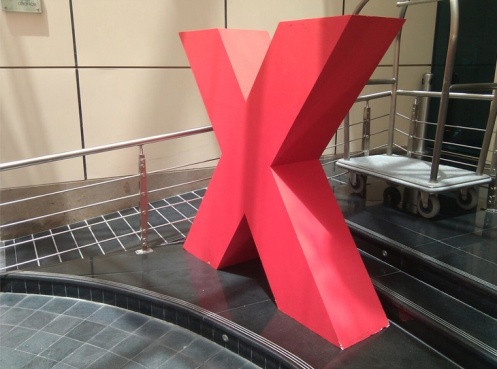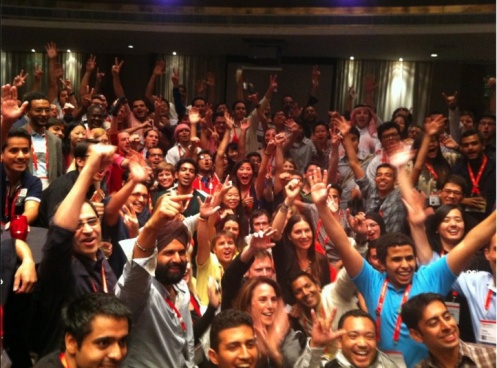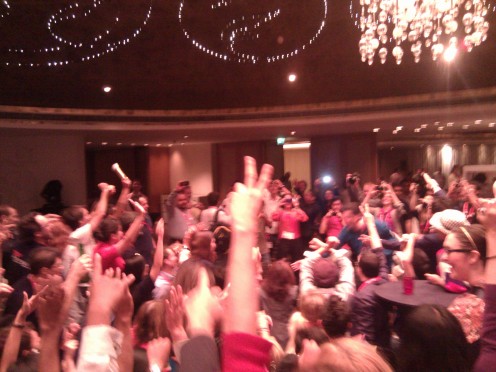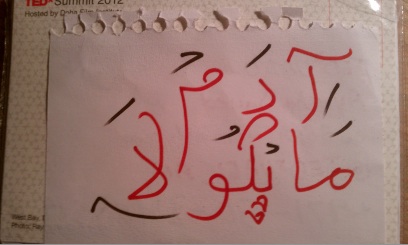TEDxSummit: Thoughts and Reflections on the “Cultural Olympics”
I don’t even know where to start…
Last week was hands down the most diverse, immersive, and educational experience I have ever had. I would even say it beats being with a diverse group of students at the UN in 2007. What happens when you put 700 leaders from 90 different countries together for a week? Well, you get ideas, relationships, and energy. Being in Minnesota can be somewhat of a downer sometimes. We tend to get stuck in the Midwest Mindset that says we are just Flyover Country, so nobody pays attention to us, nor could we ever lead the conversation at a global level. Since we are not one of the coasts, we feel (and literally are) stuck in the middle. So, getting to hang out with a diverse group of like-minded innovators from around the world in an environment very few of us had ever ventured to was very exciting. It was kind of like TED said, “Let’s just put a whole bunch of TEDxers together with a few requirements of their time and see what develops”, and that is pretty much what happened. A usual phrase I hear around TEDsters is “ideas having sex” as a way to sum up what happens at a TED Conference, but TEDxSummit in Doha was much more than the proliferation of ideas. It was a proliferation of cultures.
Now, no, we did not solve all the world’s problems in a week, but we did have some engaging conversations around the state of the world – not just from your typical intellectuals or academics pontificating as usual – but it was leaders from various global communities coming together and articulating, asking questions, and thinking creatively about what’s going on in our own backyards. In just a matter of minutes, I could hear from a Tunisian, a Brazilian, an Egyptian, an Aussie, and a Greek talk about TEDx in their communities, as well as how global issues are affecting their own worlds. And not only did we talk problems, we also talked solutions. I participated in an unconference in the Persian Gulf during Desert Day in which we discussed TEDxChange and Melinda Gates’ recent TEDtalk, “Let’s put birth control back on the agenda”:
In the group, we had the leader of TEDxMadrid (who is doing the first-ever TEDxPrison event giving inmates a platform to tell their stories and learn from one another), a developmental specialist with a focus on demography, a Moroccan woman living in Nice, France, and a hodgepodge of other TEDxers who popped in and out of the conversation. We explored the issues and talked through potential solutions to allow the global community to put birth control back on the agenda and allow women around the world access to family planning resources at their own choosing. Working with like-minded TEDsters, the conversation was around the facts. It never got politicized nor became religious in any manner. Just the facts. Just a conversation. And I would say this is what’s at the heart of what was unique about TEDxSummit and the TED and TEDx platforms. They are places where folks can come together locally and globally to exchange information, learn, and explore new possibilities without having to worry about self-promoters, spammers, quacks, and flakes interrupting the productive conversation (yes, there is a difference between quacks and flakes – deal with enough of them and you figure it out).
I took copious notes on my entire experience and will blog specifically about my observations of the Arab world as a first-time visitor to the region in another post. What I really want to communicate here is what I got out of TEDxSummit as a TEDxer/TEDster. The goal of TEDxSummit was to allow the community to self-organize and knowledge share in person. In an environment where everyone is equal, it was great to have access to some of the TEDx veterans to listen, ask questions, and connect. What sprang out of all this knowledge sharing and conversation was collaboration. Members took to themselves to create how-to videos and instructional guides for the rest of the community to have a starting point when planning events and building TEDx communities in their own geographies. Where TED has mastered visual rhetoric, story telling, and audience curation, many TEDx organizers are newly minted (read: first-time) event organizers who have a deep passion for TED and Ideas Worth Spreading, as well as the accessibility that a TEDx style platform provides for their own individual communities. Pay attention to how your environment is curated/manipulated (in a positive way) the next time you attend a TED event. You should pick up on the subtle intelligence that went into the entire design – from colors, stage, music, speaker lineup, lunch sessions, and audience diversity. The whole things feels like a week of serendipity. As if everyone you ever wished to finally get to connect with was magically transported to a far off place…and you are not the only person who experiences this serendipity. Everyone does. So if that’s the experience at the main TED events, then how are enthusiastic TEDxers supposed to replicate that? Well, I cannot share that with you at this time, but the answer is by self-organizing and knowledge sharing all of the best practices, top issues to side-step, and resources at your disposal. Here is a quick video on Stage Design that sprang up around conversations last week:
And an ad-libbed video about what the community thinks TEDx is. The video was shot in the Persian Gulf during Desert Day (there were a lot of these types of vids being made during the week. I participated in a video on education recorded by TEDxers from Korea).
The Ideas Worth Spreading line is crucial to understanding TED as a character trait (not just as a conference). Anything that grows exponentially has the power of scale behind itself like no linear item could ever attain. As you see in the picture below (taken by Michelle Lowe), two TEDxers (if I recall, it was an Algerian and Egyptian) originally started posing for a picture with one another when suddenly the entire audience (all doing their own things) nearby rushed in for an ad-hoc group picture. And as more and more of us kept joining the picture from one side of the group, others with cameras rushed to the front to snap pictures/vid as this non-verbal idea of “Group Picture Here Now!” grew organically and exponentially.
I’m in the far back left. So, I took a pic of the audience taking pictures of us above:
Now that was an idea worth spreading captured in the moment from each direction. It was fully spontaneous yet felt a bit curated considering all of the behind-the-scenes magic that TED sprinkled into the weeklong event (as always). I mean, where else in the world would an entire group of diverse strangers who hardly share a common language rush to be photographed and then high-five, shake hands, and laugh afterwards (even continuing the moment over to digital media by posting to Twitter, Facebook, YouTube, and blogging about it)..?
If there was any one philosophical point that was driven home for me as I flew the 16 hour flight from Dubai to Dallas (the long haul portion of my travels…), it was that we are all the same and have so many similarities that it was kind of scary. I didn’t just read about these similarities or hear about them. I already knew them, but had to participate in them and capture the subtleties to memory in order to re-create these simple (yet muted) facts. As we saw in Maz Jobrani’s performance (Iranian stand-up comedian) on opening night, laughter cuts through political rhetoric, religious differences, and even gender gaps. Maz walked on stage in front of probably the most diverse audience he ever performed to and literally split our stomachs with laughter. He made jokes about every culturally hot topic in the room with such intelligence that everyone felt comfortable. It was a great way to see how laughter unites us and allows us to talk about issues in a unique way. Kind of like the quote from Mary Hirsch: “Humor is a rubber sward – it allows you to make a point without drawing blood”; Maz expanded on his 2010 TEDtalk with even more comedic ferver (I’ll post his TEDxSummit talk as soon as it is released):
As Maz says, he attempts to break stereotypes through his stand-up. And I think he did a great job of it opening night at Katara. Prior to Maz and the other speakers taking the stage, our audience (freshly thrown together for the first time that day and eager to engage each other) found a common meme we could all participate in…The Wave – lol.
What’s cool about this is that it was a unique physical participatory action the audience members got to do. Equally as cool was when the attendees sang Happy Birthday to four of us who had birthdays that week. We were great at participating in past things we all had in common, but we also had the chance to create new items moving forward. The power to create in such an environment was amazing. In hindsight, we probably should have recorded more of the creative moments and strung them together.
The irony here is that prior to flying to Doha, I was thinking that Shakira’s “Waka Waka” song/vid (Official FIFA 2010 song) was a close representation for what TEDxSummit was going to feel like, though I did not share my idea/reference with the community…until I returned home and just saw a post in our Facebook group by Emily Leach saying, “As i go through my memories of last week this song keeps coming up and bring back desert day” (with the Shakira video attached):
It’s so funny how after-the-fact, it is fun participating in this dialogue, but with a little initiative and courage to share an idea, we could have maybe created our own song to represent TEDxSummit like Waka Waka represented FIFA 2010. We did, after all, have Reggie Watts hanging with us, and a TEDband that was thrown together. All the pieces were there besides the idea…scratch that…all the pieces were there besides an idea that was allowed the chance to spread. I guess if there is any take-away from what you’ve read here, I’d like for you to think about how all of our lives could use a little more curation and courage to increase the behind-the-scenes magic. As that’s the only way things really get done. As I learned from my fellow TEDxers on Desert Day, anything is possible, and when you have the right people around you, you can do great things spontaneously. Which reminded me of a line from Jay-Z, “…I got my shades on, waiting for the sun to shine my way / Got my boom box, suntan lotion waiting for action / They say when you play with skills, good luck will happen / Let’s go!”.
~ by Adam Maikkula on April 24, 2012.
Posted in Art, Blogging, Books, Comedy, Cultural Studies, Education, Experiences, Exposure, Innovation, International Relations, Music, My life, People, Philanthropy, Philosophy, Photography, Politics, Science, Social Media, Technology, Travel, Uncategorized, WOW
Tags: 2012, April, Art, Cultural Studies, Cultures, Design, Development, diversity, Doha, Entertainment, Ideas, Innovation, Life, Middle East, People, Qatar, Reflection, sharing, Technology, TED, TEDx, TEDxSummit, Travel, World






That truly was a wonderful experience and it isn’t over, yet. Things will continue to happen as we connect and collaborate within TEDx and without.
Wonderful post, Adam! I am starting to digest the Doha experience myself… hope to write something soon. Yours is inspiring me!